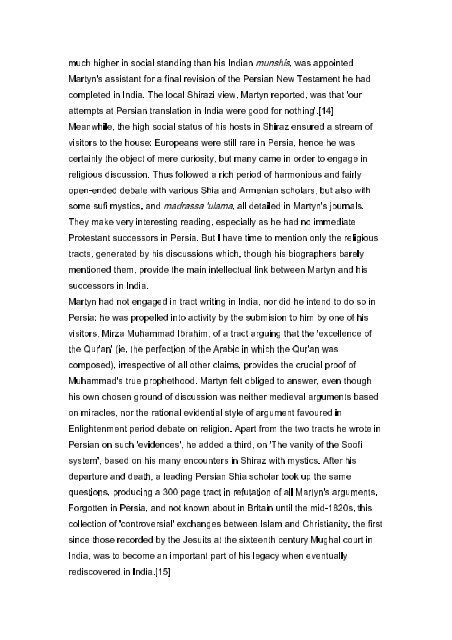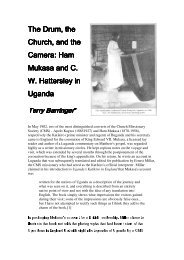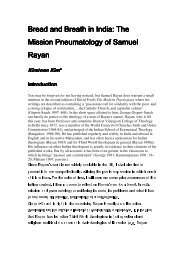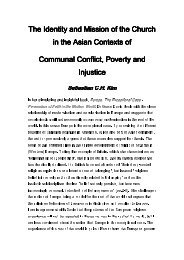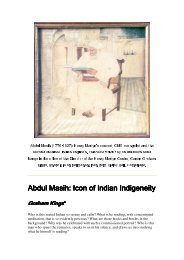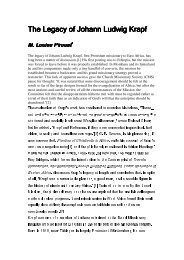the legacy of henry martyn to the study of india's muslims and islam ...
the legacy of henry martyn to the study of india's muslims and islam ...
the legacy of henry martyn to the study of india's muslims and islam ...
Create successful ePaper yourself
Turn your PDF publications into a flip-book with our unique Google optimized e-Paper software.
higher in social st<strong>and</strong>ing than his Indian munshis, was appointed Martyn's assistant for a final revision <strong>of</strong> <strong>the</strong> Persian New Testament he had completed in India. The local Shirazi view, Martyn reported, was that 'our attempts at Persian translation in India were good for nothing'.[14] Meanwhile, <strong>the</strong> high social status <strong>of</strong> his hosts in Shiraz ensured a stream <strong>of</strong> much<br />
<strong>to</strong> <strong>the</strong> house: Europeans were still rare in Persia, hence he was certainly <strong>the</strong> object <strong>of</strong> mere curiosity, but many came order <strong>to</strong> engage in religious discussion. Thus followed a rich period <strong>of</strong> harmonious <strong>and</strong> fairly open-ended debate with various Shia <strong>and</strong> Armenian scholars, but also with some sufi mystics, <strong>and</strong> madrassa 'ulama, detailed in Martyn's journals. visi<strong>to</strong>rs<br />
make very interesting reading, especially as he had no immediate Protestant successors Persia. But I have time <strong>to</strong> mention only <strong>the</strong> religious tracts, generated by his discussions which, though his biographers barely They<br />
<strong>the</strong>m, provide <strong>the</strong> main intellectual link between Martyn <strong>and</strong> successors in India. Martyn had not engaged tract writing India, nor did he intend <strong>to</strong> do so in Persia: he was propelled in<strong>to</strong> activity by <strong>the</strong> submision <strong>to</strong> him by one <strong>of</strong> his visi<strong>to</strong>rs, Mirza Muhammad Ibrahim, <strong>of</strong> a tract arguing that <strong>the</strong> 'excellence <strong>of</strong> mentioned<br />
Qur'an' (ie, <strong>the</strong> perfection <strong>of</strong> Arabic in which Qur'an was composed), irrespective <strong>of</strong> all o<strong>the</strong>r claims, provides <strong>the</strong> crucial pro<strong>of</strong> <strong>of</strong> Muhammad's true prophethood. Martyn felt obliged <strong>to</strong> answer, even though his own chosen ground <strong>of</strong> discussion was nei<strong>the</strong>r medieval arguments based on miracles, nor <strong>the</strong> rational evidential style <strong>of</strong> argument favoured in <strong>the</strong><br />
period debate religion. Apart from <strong>the</strong> two tracts he wrote in Persian on such 'evidences', he added a third, on 'The vanity <strong>of</strong> <strong>the</strong> So<strong>of</strong>i system', based on his many encounters in Shiraz with mystics. After his Enlightenment<br />
<strong>and</strong> death, leading Persian Shia scholar <strong>to</strong>ok up <strong>the</strong> same questions, producing a 300 page tract in refutation <strong>of</strong> all Martyn's arguments. Forgotten in Persia, <strong>and</strong> not known about in Britain until <strong>the</strong> mid-1820s, this collection <strong>of</strong> 'controversial' exchanges between Islam <strong>and</strong> Christianity, <strong>the</strong> first since those recorded by <strong>the</strong> Jesuits at <strong>the</strong> sixteenth century Mughal court in departure<br />
was <strong>to</strong> become an important part <strong>of</strong> his <strong>legacy</strong> when eventually rediscovered in India.[15] India,


